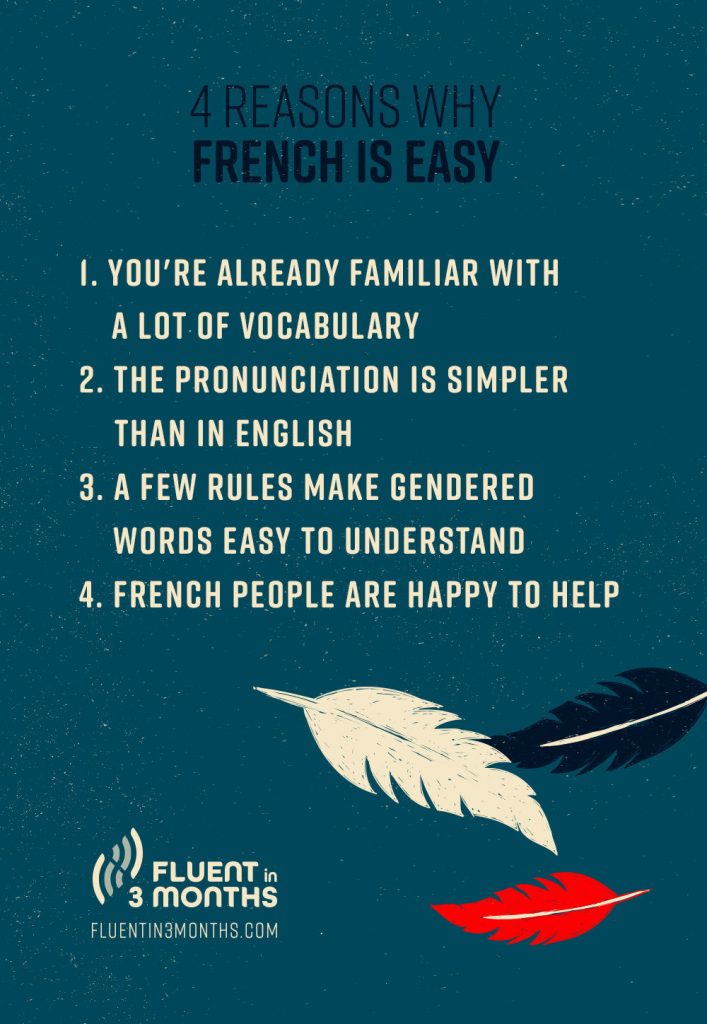Is French Hard to Learn? 4 Reasons French Is Easier Than You Think
Is French hard to learn? You might have heard it is, or tried it out and got discouraged. But I know by experience it is easier than you might think.
Speaking French can transform your life and open you up to a whole new culture, and many wonderful friendships. So I can completely understand why you’d want to learn how to speak French.
However, I’ve heard from a lot of readers who are struggling with learning French. Shouldn’t they just give up completely or turn their attention to one that seems far easier?
Don’t be silly! Why learn a language that seems more useful, when in a matter of weeks you could be having your first conversation in a language that will open you up to over 75 million speakers in over 50 countries?
French is not hard to learn, especially when compared to English! And especially when you go about it the right way.
Table of contents
- 1. You Will Understand More Quickly Than You’ve Been Told: You’re Not Learning French From Scratch
- 2. You Will Speak Earlier Than You Think: French Is Simpler to Pronounce than English
- 3. You Can Manage the Grammar With a Few Rules: Gendered Words aren’t as Confusing as They Seem
- 4. You Will Get Help: French People are Happy to Help You Learn French
- Go Forth and Conquer – Just Like William Did!
Learning French isn’t going to be as difficult as you think. In fact, it’s a language that is much easier to achieve fluency in than you would have ever expected.
Don’t believe me? Well, at least give me a chance to explain myself! Read on to find out why.

1. You Will Understand More Quickly Than You’ve Been Told: You’re Not Learning French From Scratch
English and French share a common alphabet and a large portion of vocabulary. In fact, English has more in common lexically with French than any other Romance language (which include the likes of Spanish, Portuguese and Italian).
The Romance languages belong to the Indo-European family, as does English. However, we largely have William the Conqueror, the first Norman King of England, to thank for the abundance of French words within the English language.
William led the successful Norman invasion of England in 1066 AD. He spoke no English when he ascended the throne. And although he tried to learn Old English, he failed to master this foreign tongue.
French was instead spoken within England’s courts for centuries after, which completely transformed the language to what we know it as today.
French rapidly became fashionable to learn amongst the social classes. It was spoken in schools and universities and within the court of law. Modern English words in the fields of medicine, economics, law and politics, which have a strong basis in Latin, bear a similarity to French.
English is a Germanic language that had previously had much resemblance to other Nordic languages, German and Dutch. It began to take on words of Anglo-Norman and Anglo-French origin, which influenced the vocabulary permanently.
You would be surprised at some of the words you probably use in everyday language that in fact had French origins, such as pork, blue and administration.
So, if you’re fluent in English, you’ll already have a head start in French vocabulary. You’ll be familiar with the spelling, pronunciation and meanings of words such as café, debut, encore and petite, amongst many others.
This makes French one of the easiest languages for native English speakers to begin speaking from day one.
2. You Will Speak Earlier Than You Think: French Is Simpler to Pronounce than English
Consider this.
If tomb in English is pronounced toom and womb is pronounced woom, then shouldn’t bomb be pronounced boom?
I’ve got another one for you.
Enough, rough, tough and then… slough!
How about those homographs! These are words that are spelt the same but have a different meaning. Examples include:
“I lead the dog to the water bowl that is made out of lead.”
“She wound the bandage around the wound.”
…What?!
English is not consistent when it comes to pronunciation. If you’re like me and you grew up speaking this language, rules like this will come naturally to you. You learnt them over time, through trial and error.
However, this can be extremely confusing for new learners. All languages have many rules. The problem is, English has about as many exceptions as there are rules themselves!
French pronunciation can seem difficult at first. Like English, there are a lot of silent letters. Nouns can be pronounced differently depending on whether they are masculine or feminine.
Similarly, there are several rules for French pronunciation that can drive English speakers mad. Indeed, it may seem that French at first glance, is as tricky, complicated and inconsistent as English.
I do, however, have a point to argue against this case.
You Somehow Already Know What You Will Be Facing
French is a language that English speakers come into contact with on a regular basis. It is deeply ingrained in our culture!
France is hop, skip and a jump away from the United Kingdom and Ireland. A decent chunk of Canada is French speaking. It’s a popular option in Australia, where it’s mandatory to spend one year at school studying a second language.
And I know if you were to ask many Americans what their dream destination was, Paris would be at the top of many people’s lists.
When you start learning French, you’ll already know what you’re going to have difficulties with.
You’ll be aware that you’ll have issues pronouncing that guttural ‘r’ at first. Or that many words end on silent letters, such as in the case of comment ça va? You’ll be mindful of the fact that contractions are mandatory in the French language, such as in the case of “j’adore”.
This is knowledge that you’ll have been subconsciously building upon your entire life, will no doubt come in handy as you begin to wrap your head around the French language.
3. You Can Manage the Grammar With a Few Rules: Gendered Words aren’t as Confusing as They Seem
While gendered nouns are prevalent in many European languages, they can be a source of continual frustration for English native speakers.
English nouns do have gender – but the gender is tied directly to the biological sex of the noun, with inanimate objects remaining neutral.
As a result, gender rules can seem confusing and pointless to English speakers. We are left scratching our heads as to how on earth it was decided that the sun (le Soleil) is masculine while a car (une voiture) is feminine.
However, there is no discounting the fact that the knowledge of genders in French is important. Gender has influence on pronouns, endings of adjectives and verbs and the article placed before the noun. (Le, la, un, une and so on, so forth)
Some Rules For Gender Use in French
Luckily, there are several rules you can follow to determine the gender of an object in French. Here are some to consider:
- Certain nouns referring to animals that can only be male of the species will be masculine, such as le taureau (“bull”). This is the same for feminine nouns, such as la jument (“mare / female horse”).
- There are generic terms, which can refer to either a male or female of a species. Le mouton for example, can be a sheep of either gender.
- Place names not ending in -e are masculine (Paris). If they do end in -e, they’re feminine (L’Irlande).
- You can pretty much guess the gender of a word based on the ending. Words ending in –ment, -er, -eau and –ou tend to be masculine. On the flip side, -tion, -sion, -son and -ée are feminine.
Once you’ve learned the rules, you’ll generally be able to predict the gender of a word.
Knowledge of genders is a requisite in learning many languages. Spanish, Italian and Portuguese all use two genders, while German and Russian use three.
If you are already fluent or have some knowledge of any other of the number of languages that use gendered nouns, you’ll find yourself at an advantage in learning to speak French. For example, a Portuguese speaker would have less trouble learning French in this regard, than they would in English.
If your goal is to learn more languages and you’re starting with French as a native English speaker, breathe easy! The more you learn, the more genders will make sense to you and the easier it will be when you move onto your next language.
4. You Will Get Help: French People are Happy to Help You Learn French
I hate stereotypes!
Although I found it extraordinarily difficult to get along with Parisians when I first lived in Paris, during the second time around, I was determined to remain open minded. I managed to leave with a more positive impression of the French overall after only a few hours there.
Here is the thing: I couldn’t just expect things in Paris to be exactly as they were in Ireland, or any other country I had previously lived in. I forced myself to be more understanding and as a consequence, I got what I had always hoped would happen – someone told me I spoke French très bien.
A Parisian said I spoke good French! Dreams do come true!
There are complaints that the French can be incredibly negative. If you can’t speak their language, they judge you. If you are learning their language and make a mistake, they’ll look down their noses at you with an air of disdain.
Either way, you can’t win!
Upon genuinely understanding the culture more, I didn’t find these to be true at all. Most people I’ve met have been happy to help me when I’ve been stuck – you just have to ask for it.
In fact, I’ve found it is English speakers that are more likely to ignore you when you make mistakes, out of fear of hurting anyone’s feelings! We’re a sensitive lot, that’s for sure.
If you’re struggling to understand spoken French, there’s no harm in politely asking whomever you’re talking to if they can slow down. I’m sure they’d be more than happy to oblige.
I find listening to be one of the more challenging aspects of learning a language, but fortunately there are many free resources for French available online.
Go Forth and Conquer – Just Like William Did!
French is not a hard language to learn – indeed there are many aspects of it that make it a much easier – and, I daresay logical– language than English.
So don’t get despondent and don’t give up. You’ll be eating your body weight in croissants in Paris before you know it!



Social